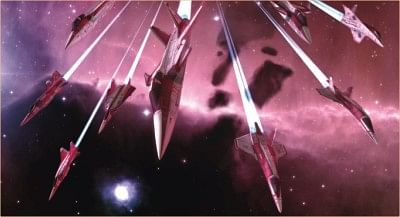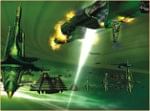
By Adnan M. S. Fakir & Wajed Al Rahman
This article is directed towards the increasingly common homes of the cloistered apartment dwelling families where the never-ending saga of war between parents and misunderstood teenagers continues. You may find what is said here beyond orthodox beliefs and may view it with skepticism, but the unavoidable fact remains that virtual games in the lives of teens let them channel their aggression into violent games and not take it out on society.
Confused? Well permit me to brief a bit more in depth. The cloistered existence of our society, arising from the urbanization does not permit the engagement of most of our teenagers in outdoor activities due to lack of space and an excess of parental concern. Normal psychological derivations show, that, a person engaged in no activity has a higher probability of becoming aggressive, not being able to direct his/her energy into any other involvement. As for the average teenager, other than studies and coaching, other forms of activity engagement has been made invalid by our societal ways, therefore aggression is bound to develop in the teenagers.

Where does all these aggressions arise from you ask? Stress builds up in teens from a combination of free thinking, hormones and living in congested concrete spaces at close quarters with other human beings who not only refuge to understand their viewpoints but also try to foist their own ideologies upon the teens. Also can be noted the significant surplus of aggression caused in few due to imbalance in one's love life, which however, can be categorized under the hormonal section. The stress generally builds up into negative anxiety which results in poor performance in academics and other extra curricular rendezvous as well as snappish and short tempered behavior.
Virtual games whether on the computer or on some other gaming console such as PS2 or X-Box etc. allows the user not only to be mentally involved in an activity but also allows a form of modern escapism. After all, a certain bit of utopianism is required to maintain a healthy human existence. This form of “utopianism” is indeed received as the gamer blasts through some irritating bunch of intoxicated monkeys dipped in Uranium imagining himself as some sort of masculine hero or what-so-ever. With less focus on the aggression and more on the “virtual heroism,” the user achieves utopianism.
Once again, build up of negative emotions in a teen are released by blasting that alien rather than talking back to parents and figures of authority and displaying other anti-social behavior such as smoking, porn-holism and in extreme cases drug induced intoxication. I will not even bring up the question of other sports with healthy kids because there is no space to even kick a ball or plant a wicket without being charged with destruction of private property; thus all the other “healthy” kids out there are also similarly suffering from chronic depression and stress.
Games allow stress relief and thus less grudge holding, disgruntled and destructive behavior and may even impose a greater positive influence on society. Real time strategy games and simulations are a great way for obtaining the lessons of responsibility and consequence in a controlled environment, giving the mind challenges on which it thrives. Of course, this effect may not be very significant, but nonetheless is applicable.
My point is: Parents, even if you allot a time slot of say an hour a day for gaming, please do our society a favor and do allow your teen(s) to play virtual games and not entirely strip them of their short span of relief. Children a decade age could have been reprimanded and caned for misbehavior, but the children of today need understanding more than scolding. That is all. Adieu.

Reviewed by Gokhra
Cast & Credits
Jerry: Jack Black
Mike: Mos Def
Mr Fletcher: Danny Glover
Miss Falewicz: Mia Farrow
Alma: Melonie Diaz
Lawyer: Sigourney Weaver

You know what's VHS? If you grew up in the 80's you would know that it is an archaic form of video that is on tape. What's tape you say? You are too young to be reading this then.
“Be kind, rewind” follows a fantastically ridiculous plot centering a video rental store that specializes in VHS cassettes. That too in 2008.
 The plot:
The plot:
If you want logic then this movie isn't for you. In fact, logic has absolutely no place in it. It would, simply put, ruin the fun.
In a corner of Passaic, New jersey, there is the aforementioned video rental shop "Be Kind Rewind." You won't find any DVDs there. Owned by a Mr. Fletcher (Danny Glover) who is in behind in rent with the store facing extinction to make way for some fancy chain shop.
The store is run by the faithful and slightly knocked in the head clerk called Mike (Mos Def). His job is to man the store while the owner goes snooping to find the secrets of the successful competitor few shops down. They rent DVDs but that couldn't be the obvious truth could it?
'Be Kind Rewind' (the shop) is frequented by Jerry (Jack Black), who works nearby in a garage. He lays his bets hyper crazy character who is paranoid about a power plant next door and it's supposed ability to melt minds. Or something like that. Hell bent on saving himself he decides to sabotage it but ends up getting zapped with a lot of electricity. While we would expect someone to burn to a crisp, he just becomes Magnetos little fat brother and becomes magnetic. And that's not good when he visits the video store as he inadvertently erases all the tapes.
Absolute disaster awaits. The tapes can't be replaced, because Mike and Jerry don't have any money. While logic tells you buying tons of old VHS cassettes for paltry cents would be easy, logic doesn't apply here.
Instead, the guys get a flash of inspiration (no doubt form the flash of electricity). They decide to re-enact the movies and rent them to unsuspecting customers.
The re-enacted movies are very, very bad and that makes it so good. Sets, props and special effects are all makeshift. But the story is told and that too in record time sof about 20 minutes for each movie. They explain that they import their versions from Sweden and thus these movies are called "sweded."
They remake everything from Robocop, Ghostbusters, Last Tango in Paris, King Kong, and Carrie among others.
The verdict:
Melonie Diaz co-stars as their female leads as the beautiful Alma. She's fast thinking and teams up nicely as opposed to Defs slow wit and Blacks manic lunacy. They brilliance lies in their semi-piracy of great classics and how they charge $20 rental fees. And people buy it and you feel so would you, almost.
There are plenty of big name stars but no one hams it up and takes over the story. While Black plays his manic best, it is balanced out by Mos and Diaz being funny without crazy. Although it starts slow, the tempo picks up as soon as the tapes get destroyed. It is an original plot line with an ending that is nice without being sappy. Heck, it might even inspire you to whipup a camcorder, get some pillows and a stick and reenact Gladiator.

 There's a blissful nirvana strategy gamers yearn for, even though experiencing it usually involves a considerable loss of sleep along with a steep drop in productivity for days on end. Sins of a Solar Empire is one of those rare games that can deliver an incredibly addictive experience that devours a healthy chunk of your life, and you won't mind a bit. Not bad for a debut game from a relatively small developer.
There's a blissful nirvana strategy gamers yearn for, even though experiencing it usually involves a considerable loss of sleep along with a steep drop in productivity for days on end. Sins of a Solar Empire is one of those rare games that can deliver an incredibly addictive experience that devours a healthy chunk of your life, and you won't mind a bit. Not bad for a debut game from a relatively small developer.
Let's get this clear: Sins isn't anything like a typical turn-based space strategy game such as Galactic Civilizations or the granddaddy of the genre, Master of Orion. Instead, this is a real-time game--but don't let that make you think that it's Command & Conquer in space. Though it's in real time, Sins unfolds at such a leisurely pace and can happen on such a gigantic scale that you'll easily manage five or six gigantic fleets at a time as you battle across multiple star systems that contain dozens of worlds.
The game is set in a distant future where the Trader Emergency Coalition--an alliance of various human worlds--bands together in the face of two threats. The first is the Advent, an offshoot of humanity that has embraced an alien philosophy and has come looking to spread the word by force. Even direr is the Vasari, a mysterious alien race that seeks the annihilation of both factions. Sins lets you play from the perspective of any of the three factions, which are approximate mirrors of one another.
Like many space strategy games, the action begins with you in control of a single planet, and from there you must explore the rest of the system worlds, locating planets to colonize, as well as resources that you can exploit to fuel your research and ship-building needs. Sins isn't as ambitious as other space strategy games that task you with taking over a galaxy; instead, the action is limited to a maximum of five local stars, each with a network of planets around it. Travel among planets is limited via strict space lanes, so some planets are natural choke points.
To support your expansion, you'll have to build a plethora of vessels. Scouts explore the planetary systems, locating ideal worlds to colonize with colony ships, as well as providing advance warning on incoming enemy fleets. Warships come in three classes. The smallest are frigates, and they include frontline combatants, siege vessels that can pummel planets with nuclear weapons, and missile platforms.

Good strategy games force you to constantly make decisions about where to allocate your resources, and Sins does an exceptional job of this, mainly because you'll usually find yourself having to juggle where to invest your precious resources. There are three resources in the game: money, metal, and crystal. Money is generated by having large planetary populations or by building trade stations. Metal and crystal can only be harvested on small asteroids.
 It's also possible to engage in a bit of diplomacy, though Sins takes a different tack than a lot of other strategy games. You can do the standard diplomatic maneuvers like declaring a nonaggression pact or forming an alliance with someone, but to do so, you've got to prove your worth to that faction by pursuing missions it puts toward you.
It's also possible to engage in a bit of diplomacy, though Sins takes a different tack than a lot of other strategy games. You can do the standard diplomatic maneuvers like declaring a nonaggression pact or forming an alliance with someone, but to do so, you've got to prove your worth to that faction by pursuing missions it puts toward you.
Then there's the pirate system, which is a brilliant way of waging war by proxy. The pirates are third-party raiders who launch attacks periodically. You can influence whom they attack by raising the bounty on one of your opponent's heads.
 If Sins has a downside, it's that larger-scale games will easily take hours upon hours to resolve. Medium-size maps will chew up six to eight hours, often to the point where you will be looking at the clock and wondering just how effective you're going to be the next day on about three or four hours of sleep. Larger games can take even longer at the default speed settings. Things would end a lot faster if there were alternate victory conditions or if the artificial intelligence would surrender after it clearly has no chance of winning.
If Sins has a downside, it's that larger-scale games will easily take hours upon hours to resolve. Medium-size maps will chew up six to eight hours, often to the point where you will be looking at the clock and wondering just how effective you're going to be the next day on about three or four hours of sleep. Larger games can take even longer at the default speed settings. Things would end a lot faster if there were alternate victory conditions or if the artificial intelligence would surrender after it clearly has no chance of winning.
Finally, the game's visual presentation is excellent. It's not a graphically flashy game, but it works on many levels. The ship designs look cool up close, and watching fleets slug it out is always fun. Pull the camera back, and ships and squadrons are replaced by distinctive icons, giving you the big picture even when you've zoomed out and are looking at a solar system as a whole. The interface is also quite elegant, and it scales nicely to a wide variety of display sizes. The audio and sound effects aren't quite as distinctive, and the music provides some decent sonic wallpaper.
In sum, Sins of a Solar Empire is an absolute must-have if you enjoy strategy games. It's an addictive, deep game that elevates space strategy to new levels. At the same time, it provides a fresh, original take on one of the oldest and most revered subgenres in all of strategy gaming.
Source: gamespot
